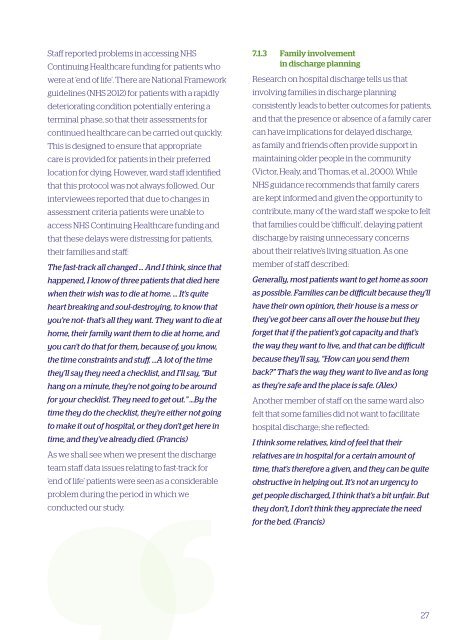Hospital Discharge
3Jzx309Yruj
3Jzx309Yruj
You also want an ePaper? Increase the reach of your titles
YUMPU automatically turns print PDFs into web optimized ePapers that Google loves.
Staff reported problems in accessing NHS<br />
Continuing Healthcare funding for patients who<br />
were at ‘end of life’. There are National Framework<br />
guidelines (NHS 2012) for patients with a rapidly<br />
deteriorating condition potentially entering a<br />
terminal phase, so that their assessments for<br />
continued healthcare can be carried out quickly.<br />
This is designed to ensure that appropriate<br />
care is provided for patients in their preferred<br />
location for dying. However, ward staff identified<br />
that this protocol was not always followed. Our<br />
interviewees reported that due to changes in<br />
assessment criteria patients were unable to<br />
access NHS Continuing Healthcare funding and<br />
that these delays were distressing for patients,<br />
their families and staff:<br />
The fast-track all changed … And I think, since that<br />
happened, I know of three patients that died here<br />
when their wish was to die at home. … It’s quite<br />
heart breaking and soul-destroying, to know that<br />
you’re not- that’s all they want. They want to die at<br />
home, their family want them to die at home, and<br />
you can’t do that for them, because of, you know,<br />
the time constraints and stuff. …A lot of the time<br />
they’ll say they need a checklist, and I’ll say, “But<br />
hang on a minute, they’re not going to be around<br />
for your checklist. They need to get out.” …By the<br />
time they do the checklist, they’re either not going<br />
to make it out of hospital, or they don’t get here in<br />
time, and they’ve already died. (Francis)<br />
As we shall see when we present the discharge<br />
team staff data issues relating to fast-track for<br />
‘end of life’ patients were seen as a considerable<br />
problem during the period in which we<br />
conducted our study.<br />
7.1.3 Family involvement<br />
in discharge planning<br />
Research on hospital discharge tells us that<br />
involving families in discharge planning<br />
consistently leads to better outcomes for patients,<br />
and that the presence or absence of a family carer<br />
can have implications for delayed discharge,<br />
as family and friends often provide support in<br />
maintaining older people in the community<br />
(Victor, Healy, and Thomas, et al., 2000). While<br />
NHS guidance recommends that family carers<br />
are kept informed and given the opportunity to<br />
contribute, many of the ward staff we spoke to felt<br />
that families could be ‘difficult’, delaying patient<br />
discharge by raising unnecessary concerns<br />
about their relative’s living situation. As one<br />
member of staff described:<br />
Generally, most patients want to get home as soon<br />
as possible. Families can be difficult because they’ll<br />
have their own opinion, their house is a mess or<br />
they’ve got beer cans all over the house but they<br />
forget that if the patient’s got capacity and that’s<br />
the way they want to live, and that can be difficult<br />
because they’ll say, “How can you send them<br />
back?” That’s the way they want to live and as long<br />
as they’re safe and the place is safe. (Alex)<br />
Another member of staff on the same ward also<br />
felt that some families did not want to facilitate<br />
hospital discharge; she reflected:<br />
I think some relatives, kind of feel that their<br />
relatives are in hospital for a certain amount of<br />
time, that’s therefore a given, and they can be quite<br />
obstructive in helping out. It’s not an urgency to<br />
get people discharged, I think that’s a bit unfair. But<br />
they don’t, I don’t think they appreciate the need<br />
for the bed. (Francis)<br />
27


